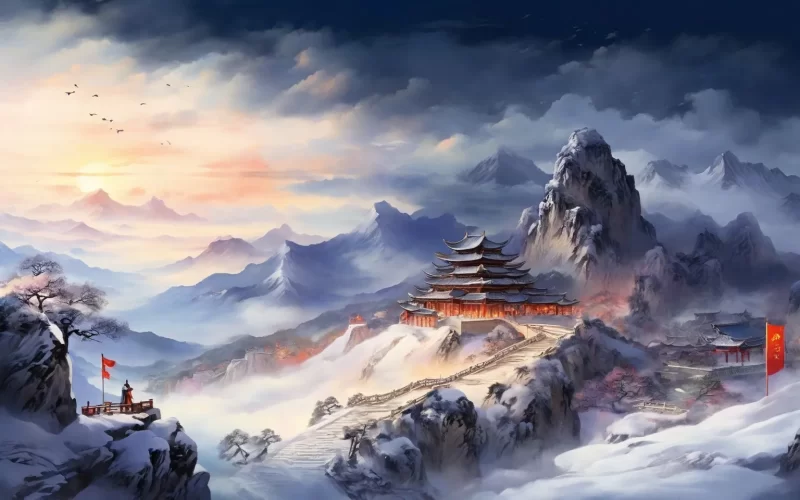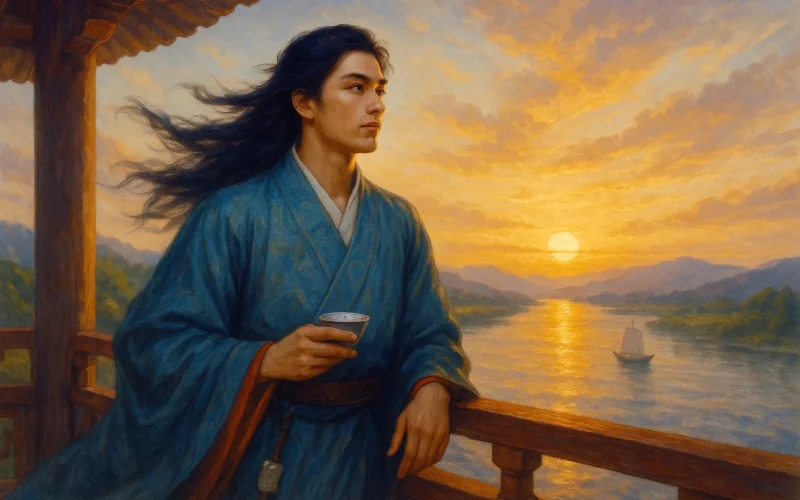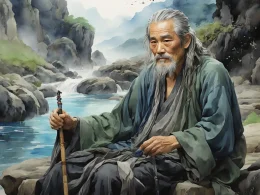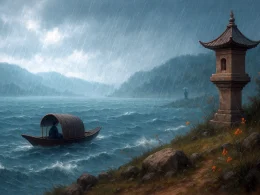My heart sank when I headed north from Yan Country
To the camps of China echoing ith bugle and drum.
...In an endless cold light of massive snow,
Tall flags on three borders rise up like a dawn.
War-torches invade the barbarian moonlight,
Mountain-clouds like chairmen bear the Great Wall from the sea.
...Though no youthful clerk meant to be a great general,
I throw aside my writing-brush --
Like the student who tossed off cap for a lariat,
I challenge what may come.
Original Poem
「望蓟门」
祖咏
燕台一去客心惊,箫鼓喧喧汉将营。
万里寒光生积雪,三边曙色动危旌。
沙场烽火侵胡月,海畔云山拥蓟城。
少小虽非投笔吏,论功还欲请长缨。
Interpretation
This poem was composed during the Kaiyuan era (713-741) of Emperor Xuanzong's reign, likely between 714 and 734 when Zu Yong was stationed at Jimen (near modern southwest Beijing). As a critical frontier stronghold of the Tang Dynasty's northeastern defense against nomadic Khitan and Xi tribes, Jimen embodied military vigilance during this peak era of national strength and stability. Amidst ambitious border generals aspiring for merit, the poet—imbued with patriotic fervor—penned this work to express heroic aspirations.
First Couplet: "燕台一去客心惊,箫鼓喧喧汉将营。"
Yān tái yī qù kè xīn jīng, xiāo gǔ xuān xuān hàn jiàng yíng.
Approaching Yan Terrace, my traveler's heart stirs with awe;
Reed-pipes and drums clamor through Han generals' camps.
"Yan Terrace" refers to the ancient Yan capital, a historically strategic site. The opening line uses geographical grandeur to evoke emotional震撼 (shock), with "stirs with awe" (惊) marking the poet's visceral response. The second line juxtaposes martial music with the imposing military camp, sketching a frontier force poised for action.
Second Couplet: "万里寒光生积雪,三边曙色动危旌。"
Wàn lǐ hán guāng shēng jī xuě, sān biān shǔ sè dòng wēi jīng.
For ten thousand miles, icy glare radiates from snowbanks;
At dawn's light on three frontiers, perilous banners tremble.
Shifting to winter imagery, the poet depicts snowfields blazing with cold light—a visually stunning tableau. "Dawn's light on three frontiers" conjures a solemn atmosphere of fluttering standards at daybreak. This dynamic interplay of stillness and motion creates cinematic tension, foreshadowing the poem's climactic resolve.
Third Couplet: "沙场烽火侵胡月,海畔云山拥蓟城。"
Shā chǎng fēng huǒ qīn hú yuè, hǎi pàn yún shān yōng jì chéng.
Battlefield beacons encroach on Tartar moons;
Coastal clouds and mountains embrace Jicheng's walls.
Here, scenery yields to strategic vision: beacon fires, alien moons, and towering landscapes frame the impregnable frontier city. Through expanding visual and geographical scope, the couplet amplifies the border's majestic aura, conveying the poet's faith in national defenses.
Fourth Couplet: "少小虽非投笔吏,论功还欲请长缨。"
Shào xiǎo suī fēi tóu bǐ lì, lùn gōng hái yù qǐng cháng yīng.
Though in youth I never cast aside my scholar's brush,
For merit now I'd plead to wield the long tasseled spear.
The finale voices unbridled ambition: even without early military service, the poet now volunteers for frontline command. Alluding to Ban Chao's "discarding the brush to join the army" and Zhong Jun's "requesting the tassel to conquer the north," the closing lines surge with heroic Tang spirit—where literary grace and martial valor merge in triumphant cadence.
Holistic Appreciation
Centered on the act of gazing, the poem progresses through visual, auditory, and psychological layers—from surveying the frontier's majestic scenery and awe-inspiring military might to stirring inner heroic aspirations. This forms a clear emotional arc: gazing begets awe, and awe begets ambition. Zu Yong masterfully blends realistic depiction with historical allusions, portraying not only the borderlands' vast grandeur and strict vigilance but also the literati's ideal of achieving merit through frontier service. Grand in conception and vigorous in spirit, this work epitomizes High Tang frontier poetry.
Artistic Merits
- Structural Cohesion: Using gazing as the narrative thread, the poet layers geography, military affairs, natural phenomena, and human psychology into an organic emotional tapestry.
- Allusive Depth: References like Ban Chao abandoning his brush and Zhong Jun volunteering for battle enrich the poem's historical weight without ostentation.
- Dynamic Diction: Verbs such as "startle," "stir," "encroach," and "surge" intensify the imagery's kinetic energy, enhancing rhythm and momentum.
Insights
This poem channels High Tang's national confidence into frontier inspiration, reminding us that even in civilian roles, one should nurture patriotic dedication and embrace era-defining responsibilities. Every sincere intention and action contributes to the greater cause. Just as "gazing at Ji Gate" ignited the poet's self-motivation, it urges us to temper our resolve through observation and seize opportunities to make a difference.
Poem translator
Kiang Kanghu
About the poet
Zu Yong (祖咏, 699 - 746?), a native of Luoyang, Henan, was a High Tang dynasty landscape poet who attained the jinshi degree in 724. Associated with Wang Wei and Chu Guangxi, he later retreated to Rufen as a recluse. Though few works survive, his five-character verse—spare yet classically elevated—established him as a key forerunner of High Tang nature poetry.











